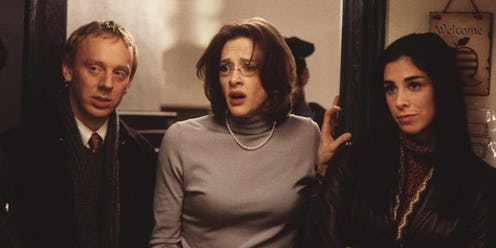Entertainment
It's Time We Give Patty Of 'School Of Rock' The Credit She Deserves

Believe it or not, it has been 15 years since School of Rock hit theaters. The Richard Linklater-directed comedy is beloved by fans, but some of its elements deserve more credit than they initially got — such as Sarah Silverman's character Patty. In School of Rock, Patty is made out to be pretty much the worst, a cliched "nag" who is basically the movie's villain. But looking back on her 15 years later, it's clear that Patty never deserved that hate, and she's actually way more relatable than you may have originally thought.
If you don't recall, Patty is the girlfriend of the real substitute teacher Ned Schneebly, played by School of Rock screenwriter Mike White. She bullies Jack Black's Dewey Finn into getting a job by, incredibly enough, demanding that he pay his share of the rent. She's also the one who blows the cover on the band's covert rock operation. The joke of her character, essentially, is that Patty wants Ned to be less of a pushover, while she's the one doing the pushing. And at the end of the film, Ned triumphantly slams the door in her face. It's a funny comedic bit, but it all contributes to a nagging "shrew" stereotype that today, feels more than a little outdated.
Patty may be meant to be the bad guy of School Of Rock — but, for adult women in 2018, it's kind of hard to disagree with a single thing she says. You'd be mad too if your boyfriend's unemployed roommate refused to leave or help with the rent. She's harsh, but correct. "We have jobs," she says early on in the movie. "We contribute to society." Accurate! "It's one thing to throw your life away," she tells Dewey after discovering that he's been illegally impersonating her boyfriend, "but then to put Ned's career in jeopardy is so selfish!" Yup. Meanwhile, Dewey refers to her as a "nightmare," "brainwashing" Ned, and "mommy." It's not a girlfriend's job to do emotional labor for her partner. Patty is not even that mean, but she's constantly framed as the enemy.
As kids, many of us related to Dewey and his young charges at school, who truly just want to have fun. But as we grew up, we realized that Patty is simply being a responsible adult around difficult, immature men. Far too many women grow up to discover that we don't get to be the Deweys and the Neds in life — we become the Pattys instead, told we're ruining guys' good times and having to always keep things in line.
Patty is not the only female character in School of Rock who is portrayed as being out to spoil the party. Principal Mullins (Joan Cusack) admits that she's wound too tight, but has apparently lost her sense of humor appeasing all of the private school parents. It takes booze and Stevie Nicks to loosen her up, and it's done so that Dewey can get plans approved. Meanwhile, there's Miranda Cosgrove's Type A pre-teen character Summer, who threatens to tattle until Dewey gives her a position of authority in the band.
If the film was made today, one could only hope there would be some other kind of closure for all of these women, and one that goes beyond telling them to "loosen up" and stop being so uptight. For Patty, it could be something as simple as Dewey expressing his understanding of how exasperated she must be with him after a particularly difficult band practice. He grows in other ways during the movie, and essentially does what she wants him to do — but at the end of School of Rock, Patty doesn't get the credit she deserves whatsoever.
While School of Rock is not an overtly sexist film and presents multiple female characters, including young women of color, the "shrew" trope is hard to escape and a real bummer when you rewatch the movie 15 years later. After all, in life, women are, time and time again, expected to be accommodating to the whims of men; it's how we end up pretending to be Cool Girls a la Gone Girl, and getting told by guys that we're being too annoying or demanding.
And Silverman is far from the only female comedian to be seen as this wet blanket trope in mainstream comedy; other examples include Rachael Harris in The Hangover, Katherine Heigl in Knocked Up, Leslie Mann in Knocked Up, and Rashida Jones in I Love You, Man. All of those women have established themselves as leading ladies in their own right, and yet they each took on these frustratingly cliched roles. In 2008, Heigl spoke to Vanity Fair about how Knocked Up is "a little sexist," in how it portrays women as kiljoys, sparking outrage from fans everywhere. Yet she had a point, and perhaps it was heard; Seth Rogen, Heigl and Mann's costar in the film, later went on to write Neighbors, which had a more accurate and progressive depiction of women. It's no shocker that Rogen's wife Lauren Miller worked on that movie's script, contributing to the (still pending) death of this stereotype.
15 years after School of Rock, Silverman has a huge body of work, a strong comedic voice, and many varying characters on her resume. But when you re-watch the film, Patty's sexist "shrew"-ness can't be ignored. Hopefully we'll see the end of this trope on screen soon, and Patty can eventually be appreciated by all for what she is — absolutely, without a doubt, right about the men in her life.